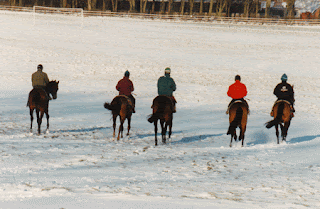"Sometimes horses die in races. Death is an unavoidable fact of life; racing has its dangers and now and then horses (and jockeys) fall prey to them. Joseph Stalin once said that "a million deaths are a statistic, one death is a tragedy ."
"It may be unpalatable to admit it but the case exists for adapting that doctrine for use in the public perception of racing like so - 'one death at out-of-the-way Fontwell is a statistic , one death in the white-hot-glare of Aintree is a tragedy.'
"Unfortunately, two horses were killed in the Grand National; ORNAIS fell at the fourth and broke his neck, DOONEY'S GATE fell at Becher's two fences later and broke his back. This was very bad; what made it worse was that on the second circuit the bodies of both horses remained where they fell, ORNAIS covered by a tarpaulin and DOONEY'S GATE shrouded in screens but both eminently visible to uncountable millions of television viewers as exactly what they were - two dead horses.
"For the first time ever, the field was waved around the fences where ORNAIS and DOONEY'S GATE lay. This innovation, made possible by the narrowing of all the 'country fences' at Aintree, undoubtedly prevented even more unpleasant scenes and credit is due the Aintree executives for this initiative. The damage, though, was already done.
TIME up the long final fence and the line. No question of cruelty is applicable; it was, however, excessive use and the stewards banned Maguire for five days as a result.
"As the horses pulled up after passing the line, their jockeys dismounted and the horses were doused with buckets of water. This had the effect of suggesting to the uninformed that every finisher was on the verge of collapse, when this was certainly not the case.
"It was an unseasonably hot day and after four and a half miles were indeed in need of being cooled down. The buckets of water had been planned in advance and were not designated as an emergency measure - unfortunately, no-one told the media, who could only surmise, speak and write the worst when all the jockeys jumped off and the water was liberally applied.
"In all, then, the once-a-year viewing public were witness to horses killed in action, thrashed in order to win and then saved from collapse only by for desperate measures. From such a narrow perspective it looked very bad. There were complaints to the BBC and to the RSPCA, and the good name of the National was dragged through the mud.
"Had the day been overcast and had BALLABRIGGS won more easily, thus removing the need for Maguire to be so energetic, the occasion would have been spared much of the public opprobrium. Chance is a major eliment in racing and Aintree and the National were unlucky.
"These days, though, the facts must not be allowed to get in the way of public perception, however uninformed or ignorant that may be. As racing seeks to woo a wider audience it must consider even the opinions of those who have little interest in the sport, with all the consequences that entails.
"The National fences have been altered - the fence that claimed ORNAIS has been trimmed by two inches, the ground on the landing side of Becher's
Brook has been raised to mitigate the drop. Other minor alterations have been implemented, although fears that both the field size and the lengthy run in to the first fence would be reduced were not realised.
"Cries of 'now it's just a glorified hurdle race' were heard, although not taken seriously. The Grand National still has it's teeth, it is still a fearsome test. And so it must remain.
"MAGUIRE'S whip ban may have contributed to the BHA's (bloodhorse illiterate) revision of the whip rules, although the process had begun months beforehand. The necessity to be seen to be doing something to allay public disquiet about the whip was no doubt a factor in the new rules, a necessity impelled by the reaction to what must now be termed a fateful day at Aintree in April.
"Next year, of course, the pressure before the Grand National will be even greater. All the horses must come home safely, all the jockeys must remember the new whip rules in the heat of competition, otherwise our motives will again come under fire. Those who seek to undermine the race and racing itself will be even more alert than usual for anything that might be considered unacceptable, no matter how unavoidable or unforeseen it may be.
"Of course BALLABRIGGS may well return for a second National, and should he defy convention by landing a famous double will get the perception and recognition he merits, which he merited last time. There were no winners in the 2011 Grand National, only losers - and BALLABRIGGS deserves better than that."




















